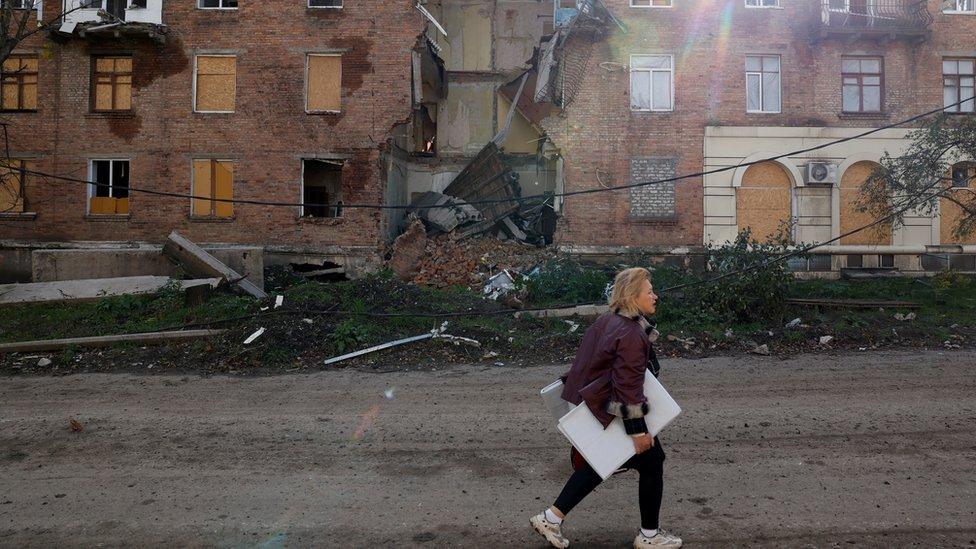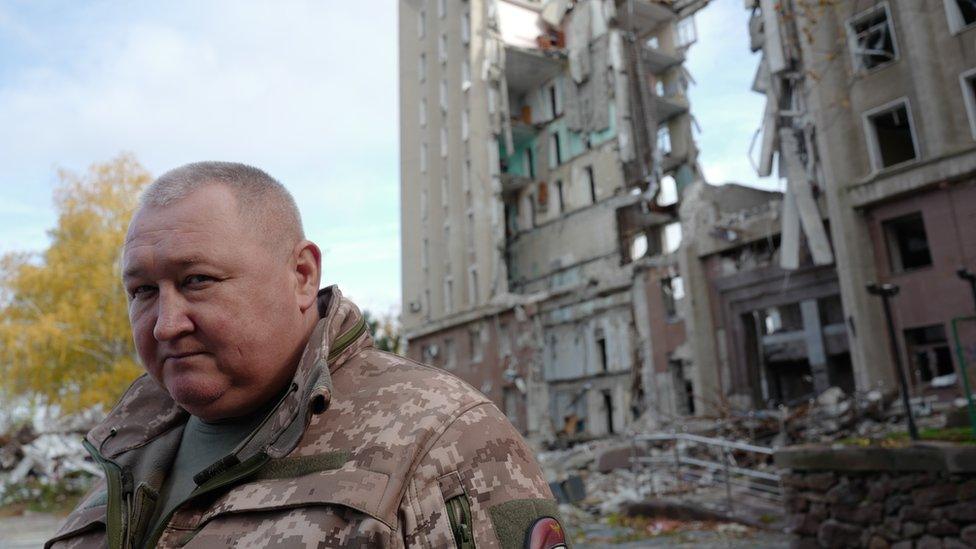Ukraine war: West warned against complacency on air defence support
- Published

A woman walks past a building damaged by missile strikes in the eastern Donbas region of Bakhmut, Ukraine
Up to now, neither Russia nor Ukraine has been able to gain control of Ukraine's skies, largely because their pilots don't want to risk getting shot down by the other side's air defence systems.
While Russia's air force far outweighs Ukraine's, both in size and sophistication, Russia has resorted to firing long-range ballistic and cruise missiles, recently augmented by cheap, mass-produced Iranian Shahed-136 explosive-laden drones.
Ukraine has had some success in shooting many of these down, but those that do get through have severely damaged Ukraine's power and water infrastructure, just as winter is setting in.
And now a new report is warning that Ukraine is in danger of running out of the weapons it needs to stave off the massive Russian air attacks.
The report, from London-based think tank the Royal United Services Institute (Rusi), warns that unless Western nations maintain and step up their supply of air defences to Ukraine. then Russia is likely to use the same bombing techniques it used in Syria, to devastating effect.
Russia has put the hard-line Gen Sergei Surovikin in command of its Ukraine campaign, the same general who oversaw the intensive bombing of cities such as Aleppo.
Weapons experts from Rusi have spent months on the ground in Ukraine, interviewing military intelligence officers and air defence operators, as well as examining the remains of downed Russian missile systems.
Small, portable rocket launchers known as MANPADs have played a role here, alongside larger systems such as the Gepard self-propelled anti-aircraft systems supplied by Germany.

The report's lead author, Justin Bronk, told the BBC that what Ukraine really lacks is modern, multi-role combat aircraft to keep the Russian airforce at bay. He suggests one possibility would be Nato's F16 fighter, of which thousands have been built.
But the drawback here is that it needs long, pristine runways which would be vulnerable to Russian targeting. Another candidate, he says, is Sweden's Grippen aircraft which would be able to operate from small, discreet forest bases.
But Western nations have been wary of providing Ukraine with such powerful weapons that they provoke President Vladimir Putin into taking even more drastic action.
So far, Nato-supplied weapons have nearly all been for clearly defined defensive purposes, such as pushing back Russian artillery, ambushing invading tank columns or shooting attack drones out of the sky. Sending advanced combat aircraft would be a major step up, risking escalation between Moscow and the West.
Still, the RUSI report calls on the West not to be complacent on the issue of Ukraine's air defence.
It concludes that it's only because Russia has been unable to destroy Ukraine's surface-to-air missile systems that its air force has not repeated its strategy in Syria of reducing large parts of the cities to rubble. Resupplying Ukraine's defences, it argues, is therefore a matter of urgency.
Related topics
- Published7 November 2022

- Published4 November 2022
